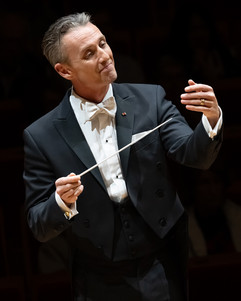REVIEW: The English conductor impresses with accomplished reading of Dvořák staple.

The third in line to the throne of Carl St.Clair’s music directorship stopped by Thursday night at Segerstrom Concert Hall, as the Pacific Symphony continued its season-long slate of conductor tryouts.
It’s an been entertaining parade so far and the orchestra is sounding invigorated. Englishman Alexander Shelley is the latest candidate, and he, like the others before him, brought a solid resume to the interview. He is currently music director of the National Arts Centre Orchestra in Ottawa (one of Canada’s leading orchestras) and principal associate conductor of the Royal Philharmonic in London. Now 44, for 8 years he was the youngest chief conductor of the Nuremberg Symphony Orchestra, until 2017.
Shelley has led the Pacific Symphony once before, back in 2012, but all the candidates, new or not, have to jump through several hoops, and he got one of them out of the way before a note was played: talking to the audience. I am pleased to say he skipped rehashing the whole story of Dvořák’s “New World” Symphony, devoted but a few moments to the Chopin concerto, and spent most of his brief time discussing the unusual opener, Sophia Gubaidulina’s Fairytale Poem, and did a pretty good job of it.
(Talking to audiences is an important part of a conductor’s job these days and they are by no means equally skilled at it.)
Gubaidulina’s piece, from 1971, written for a chamber orchestra including harp, piano and percussion, but no brass, is that rarest of things, an avant-garde charmer. It was composed during the Soviet era and its concurrent aesthetic strictures. One suspects that the cute and bittersweet fairy tale — involving a sad little piece of chalk doomed to scribbling sums until a boy takes it out of the classroom and draws fantastical pictures — that the music is supposed to depict may have been attached to it to confound the authorities.
At any rate, it’s filled with lots of things that audiences hate, like atonal melodies and minor seconds and dissonant thuds and anxious trills and tremolos. And while Gubaidulina often uses the various techniques to shimmering and gossamer effect, the little story involved definitely helps put the piece over. Nothing wrong with that.
Shelley led a perfectly poised, well prepared and dramatically cogent account. It was a welcome opener, though it put little attention on the conductor.
Neither did what followed — Chopin’s Piano Concerto in F minor — unless one was paying close attention. The orchestration of this concerto, the work of a 19-year-old, is notoriously awkward and stilted and it gives the orchestra little chance to impress. Yet Shelley brought such great elegance to his reading, tapering phrases, limning lines, blending sounds, that one reconsidered the conventional assessment.

His soloist was the French pianist David Fray, who sat in a straight-backed chair a la Glenn Gould and looked all philosophical during the orchestral interludes until it was his turn. Then, head down, he played with unusual energy and snap, turning what is often considered decorative filigree into little musical missiles of expression. It generally worked and was certainly impressive, though he didn’t make it sound easy. Arthur Rubinstein would have probably put one arm around his shoulder and say, “Relax, young man, it’s Chopin.” Fray’s account of the Larghetto, where he did relax some, was especially beautiful though, full of luxurious color and vocal breadth.
Fray’s encore was the Allemande from Bach’s Fourth French Suite, played with liquid eloquence.
One has to admit that it was a little disappointing that Shelley chose Dvořák’s “New World” Symphony as his display piece, not because it’s bad, of course, but because of its ubiquity. Still, it was soon apparent why he had chosen it and, in the event, one didn’t mind hearing it again at all.
Shelley is a lean and tall and handsome figure on the podium. His conducting technique is stylish, like his dress, and expressive; he often took the baton out of the equation and led with his hands alone, and he sometimes probed little corners of the score rather than the main line.
Alexander Shelley conducts the Pacific Symphony. Photos courtesy of Pacific Symphony/Doug Gifford
He conducted the work without score, and fully engaged with the musicians. The interpretation was a pretty standard one but so full of rich detail that it sounded fresh and new. Shelley paid a lot of attention to dynamics, which were continually varied and carefully balanced. He also didn’t miss a beat in the transitions. A listener doesn’t necessarily lay in wait for the delight of transitions, but when they go this well it’s like sitting in the passenger seat of a well driven sports car.
The orchestra was in fine fettle, too, playing with precision and warmth and enthusiasm. Colors were vivid; accents were sharp. The musicians seemed to be enjoying themselves and the French horns, especially, had a field day.
It’s way too early to predict a winner in this conducting jamboree, but the Pacific musicians did Shelley an honor after the performance. Returning to the stage during the ovation, Shelley asked the orchestra to stand and they refused, giving him a bow all by himself.
New World Symphony
ARTISTS:
Alexander Shelley, guest conductor
David Fray, piano
Pacific Symphony
PROGRAM:
Sofia Gubaidulina: Fairytale Poem
Chopin: Piano Concerto No. 2, with David Fray, piano
Dvořák: Symphony No. 9, "From the New World"
When: 8 p.m. Nov. 30 - Dec. 2
Where: Renée and Henry Segerstrom Concert Hall, 600 Town Center Dr, Costa Mesa
Cost: Remaining seats available between $99 - $225
Contact: pacificsymphony.org
Classical music coverage at Culture OC is supported in part by a grant from the Rubin Institute for Music Criticism. Culture OC makes all editorial decisions.














